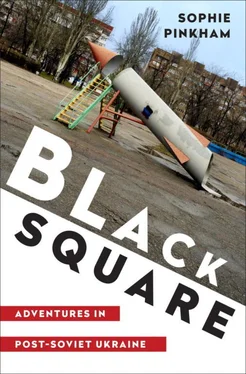Since Soviet medicine preferred shots to pills, Soviet children got over their fear of needles early. The high is more intense when you inject a drug, and it’s more economical, since you don’t need as much. People shot up with old-style glass syringes, which could be used over and over, and shared them readily, as if in a parody of Bogdanov’s vision of a communal blood supply. In Russia, there were rumors that HIV was transmitted not through dirty needles but through heroin that scheming Central Asians had infected in order to wipe out the Russian people. (This didn’t stop Russians from using heroin.) Another popular conspiracy theory was that HIV was invented by American pharmaceutical companies; this stopped people from taking HIV medications when they finally became available. Some drug users knew about HIV but didn’t worry about it much. Drug addiction shortens your perspective; if you’re in withdrawal, it’s hard to think about anything but your next fix.
By the late 1990s, there was a marked increase in HIV rates among army conscripts and pregnant women, two groups that were tested routinely. Post-Soviet governments continued to do little to prevent or treat HIV and AIDS; instead, they threw large numbers of drug users into prison, where HIV spread even faster. (I once heard about forty Russian inmates injecting heroin with a single syringe fashioned out of a ballpoint pen.) Police loitered outside pharmacies, waiting to fill their arrest quotas with drug users who’d come to buy syringes. If they didn’t have drugs on them, they might have used needles, or a cotton ball with the trace amounts of drugs needed for a conviction. If not, it was easy enough to bully or torture them into confessing. Drug users were easy prey. They were considered “socially unproductive”: dangerous, useless members of society, like the “parasites” prosecuted in the Soviet era. Just as HIV had become treatable, even manageable, the post-Soviet states produced what would soon be the fastest-growing HIV epidemic in the world. Russia and Ukraine were hardest hit.
AFTER RETURNING to New York from Siberia, I got a job at the Open Society Institute, a grant-making organization based in New York. OSI was founded by George Soros, a Hungarian who escaped the Nazis, made a fortune, and decided to use some of his wealth and influence to try to ease the transition from Communism after the fall of the Soviet Union. My job was in the international public health program, which had started needle exchange programs throughout Eastern Europe and had funded the Red Cross in Irkutsk.
At first, most of my responsibilities were with the palliative care program, which sought to relieve pain, especially for terminally ill patients. Palliative care was a strange field for a twenty-three-year-old: hot with indignation, optimism, and the desire to rescue everyone in need, I was in no mood to accept the reality of death. Still, the job promised to take me back to Russia someday; as depressing as Irkutsk had been, I was hooked. In the meantime, I enjoyed pressing a button and sending thousands of dollars to Georgia, Romania, or Ukraine, learning to recognize the family names (Gomiashvili, Dumitrescu, Savchenko) peculiar to each country. I bought a map of Eurasia and hung it on my cubicle wall, memorizing all the Eastern European capitals and hoping to visit every one.
A few months after I started, I accompanied my bosses to a palliative care conference in Budapest. Most of the attendees were in late middle age or older; they kept asking me if I was somebody’s child. I sat in the back of the hall, eating scones and taking minutes. One presenter spoke indignantly about the tremendous discrepancies in per capita morphine consumption in countries around the world. The doctors practiced telling a patient he was dying of lung cancer. It involved many hypotheticals: What kind of person are you? Are you the kind of person who wants to know the truth, even if it’s bad news? I learned that in palliative care, priority is given to patients who are both conscious and dying, and whose disease progression is defined as apocalyptic. I’d never known that apocalyptic was a medical term.
At the cocktail reception after the conference, I waited for a drink beside an almost freakishly tall man, young but not very, thin to the point of emaciation, with a shaved head. His eyelids drooped over bored, off-kilter black eyes. With his beaklike nose, he resembled a dissolute vulture. Inexperienced though I was, it was obvious to me that he was not a palliateur or an oncologist: he looked more like a lost member of the Ramones, or Iggy Pop’s Eastern European cousin. I introduced myself, just as he plucked the last orange from the bartender’s bowl and started eating it, peel and all.
With a heavy Russian accent but an easy drawl, he told me that his name was Alik. He offered me his hand; the skin was soft and loose.
Alik was a doctor and activist who worked to help Eastern European drug users get HIV treatment. He had come to the conference because he was trying to learn more about palliative care for drug users, who were almost always denied pain medication. His interest in palliation was not purely professional: he soon mentioned that he was not only a doctor, but an on-again, off-again drug user.
I told him about Irkutsk; he had been there. I told him about the tulips; he said that his friends, activists from St. Petersburg and Moscow, had trampled them in protest against the Russian government’s refusal to take meaningful action against AIDS. I was ashamed to have been associated with the tulips, and eager to enter the ranks of the tulip stompers.
When the reception was over, we adjourned to my hotel room. I wasn’t sure if it was a good idea to let this strange man come upstairs, but Alik was more interested in stories than sex. He dazzled me with a long series of unbelievable anecdotes. It turned out that he was from Kiev, though he had spent some years working at a factory in Liverpool, and in Africa working for an international AIDS NGO. While there, he’d gotten a child’s HIV-infected blood sprayed in his eye. I wondered whether it was the eye that drifted off to one side, damaged, he told me, when another child at his school had beaten him on the head with a stone. He let me touch the soft spot on his skull, and let me in on a few secrets: Lou Reed had HIV, and one of his AIDS activist friends had slept with Tennessee Williams.
“When did Tennessee Williams die?” I asked, suddenly suspicious.
He changed the subject, turning to his native land.
“My father was in KGB, you know. He was anti-Semite. The most important thing my father taught me is that I am a Jew. My nanny killed man. But at that time in my country, everybody killed man. My granny killed man too …”
He waved his hand dismissively, and sniffed.
BEFORE I MET ALIK, I was just another girl in a cubicle, doing the usual two years before leaving for graduate school, the standard trajectory for administrative assistants at OSI. I had the feeling that I was a mass-produced good. My row of cubicles was almost entirely female, dark-haired and petite. We all wore colorful pashmina shawls to protect us against the air conditioning, and we got our periods at the same time. I had replaced Danielle, another small, dark-haired, Ivy League–educated woman in her mid-twenties, who was moving to Africa to do something more interesting than filing grant reports. It was true that I went home at night and read books about Russia—but how could anyone guess that as I sat at a staff meeting, taking notes?
With Alik’s help, I was promoted to a job working on programs that reduced drug-related harm through needle exchange, drug treatment, and other services. Alik and I spoke often on the phone and exchanged frequent emails. Over the next year I learned more about his life, finding the facts in his rushing river of auto-fictionalization.
Читать дальше












